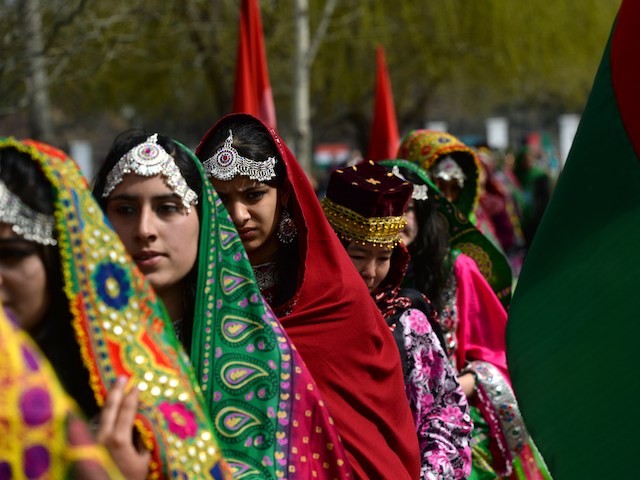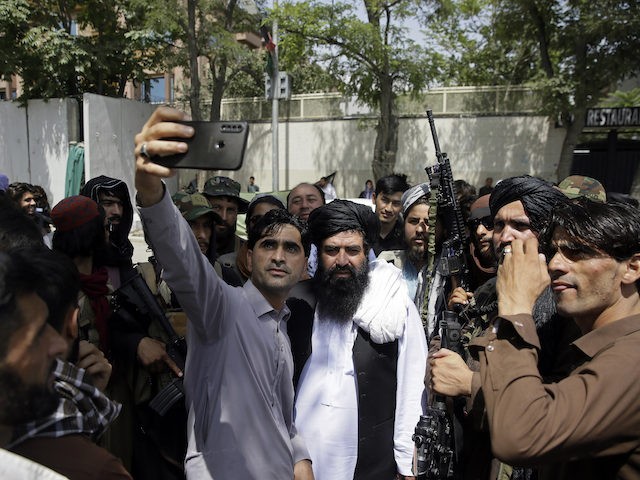Members of the Taliban terror group posed for photos and selfies at Paghman Hill Castle, a scenic tourist site located northeast of Kabul, Afghanistan, in a video published by the South China Morning Post on Sunday.
The video, first released by Agence France-Presse on August 19, was reportedly recorded shortly after the Taliban seized full control of Afghanistan on August 15 by ousting the country’s U.S.-backed government from Kabul.
The footage shows over a dozen Taliban jihadists walking along the grounds of Paghman Hill Castle, which stands as a symbol of Afghan government corruption for many in Afghanistan. The country’s U.S.-backed government opened the site in 2014 after investing over $10 million to build the castle in Paghman, a picturesque resort town just outside of Kabul, the Afghan national capital. The Afghan government constructed the castle specifically to host an international festival marking Norouz, the Persian New Year, in 2014. The holiday is one of the most significant events of the year in Afghanistan.
“But in a move that has been widely criticized, the Afghan government abruptly ditched its original plan to hold the one-day event at a specially-built castle in Paghman,” Radio Free Europe/Radio Liberty (RFE/RL) reported in March 2014.
The Afghan government moved the event to the grounds of Kabul’s heavily fortified presidential palace (Arg) instead. The decision outraged locals and Afghans nationwide who alleged that the last-minute change proved the national government did not have the capability to provide adequate security for the festival outside of Kabul.
“The government’s official reason for the move was that work on the castle was incomplete. Many in Kabul have accused the government of negligence and poor mismanagement,” RFE/RL noted at the time.
Afghanistan’s 2014 Norouz festival was slated to host “around 700 local and foreign leaders from 11 countries, including the leaders of the Central Asian republics and of Iran, Iraq, Pakistan, and Azerbaijan,” according to the report. “The high-level delegations in attendance will hold high-level talks on regional security and trade on March 27 [2014], after which they will attend the Norouz festivities in the presidential gardens.”

Traditionally clad Afghan women attend the official Nawroz festivities at the Presidential Palace in Kabul on March 27, 2014. (Wakil Kohsar/AFP via Getty Images)
A Kabul resident named Abdul Aziz told RFE/RL the Afghan government’s official reason for ditching plans to host the festival at Paghman Hill Castle was “a sham.”
“The government keeps saying we will ensure security,” Aziz said. “They say we have the military and the police and will ensure 100-percent security. But they can’t — there are attacks everywhere on every day.”
Aziz referred to “a recent spate of deadly militants attacks” that left dozens dead across Afghanistan at the time. The attacks were part of soaring nationwide violence caused by militants who vowed to disrupt a then-upcoming Afghan presidential election.
In addition to taking in the panoramic vistas offered by Paghman Hill Castle, other images of Taliban jihadists apparently enjoying light-hearted activities in Kabul — such as eating ice cream and riding bumper cars at an amusement park — have surfaced on social media.
#Taliban eat ice-cream #Kabul #Afghanistan . pic.twitter.com/du5g9QRZIx
— Abdulhaq Omeri (@AbdulhaqOmeri) August 17, 2021
The images contrast starkly with the violence inflicted by the terror group as it stormed Afghanistan’s national capital and seat of government on August 15. The jihadist group deposed Kabul’s U.S.-backed government, ending its nearly 20-year-long rule over Afghanistan since the U.S. invaded the country in 2001.

COMMENTS
Please let us know if you're having issues with commenting.